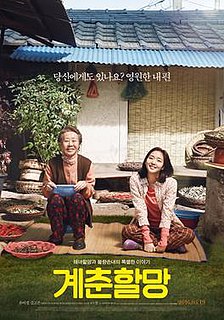
Joseph John Campbell (1904–1987) was an American Professor of Literature at Sarah Lawrence College who worked in comparative mythology and comparative religion. His work covers many aspects of the human experience. Campbell's most well-known work is his book The Hero with a Thousand Faces (1949), in which he discusses his theory of the journey of the archetypal hero shared by world mythologies, termed the monomyth.

The underworld is the world of the dead in various religious traditions, located below the world of the living. Chthonic is the technical adjective for things of the underworld.

Canola oil, or canola for short, is a vegetable oil derived from a variety of rapeseed that is low in erucic acid, as opposed to colza oil. There are both edible and industrial forms produced from the seed of any of several cultivars of the plant family Brassicaceae, namely cultivars of Brassica napus L., Brassica rapa subsp. oleifera, or Brassica juncea, which are also referred to as "canola". According to the Canola Council of Canada, an industry association, the official definition of canola is "Seeds of the genus Brassica from which the oil shall contain less than 2% erucic acid in its fatty acid profile and the solid component shall contain less than 30 micromoles of any one or any mixture of 3-butenyl glucosinolate, 4-pentenyl glucosinolate, 2-hydroxy-3 butenyl glucosinolate, and 2-hydroxy- 4-pentenyl glucosinolate per gram of air-dry, oil-free solid."
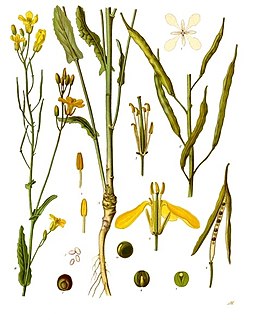
Rapeseed, also known as rape, oilseed rape, and, in the case of one particular group of cultivars, canola, is a bright-yellow flowering member of the family Brassicaceae, cultivated mainly for its oil-rich seed. It is the third-largest source of vegetable oil in the world.
Erucic acid is a monounsaturated omega-9 fatty acid, denoted 22:1ω9. It has the chemical formula CH3(CH2)7CH=CH(CH2)11COOH. It is prevalent in wallflower seed with a reported content of 20 to 54% in high erucic acid rapeseed oil, and 42% in mustard oil. Erucic acid is also known as cis-13-docosenoic acid and the trans isomer is known as brassidic acid.

Classical Greco-Roman mythology, Greek and Roman mythology or Greco-Roman mythology is both the body of and the study of myths from the ancient Greeks and Romans as they are used or transformed by cultural reception. Along with philosophy and political thought, mythology represents one of the major survivals of classical antiquity throughout later Western culture. The Greek word mythos refers to the spoken word or speech, but it also denotes a tale, story or narrative.
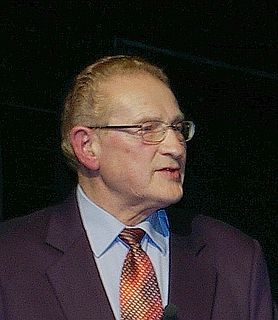
Percy Schmeiser is a farmer from Bruno, Saskatchewan, Canada. He specializes in breeding and growing canola. He became an international symbol and spokesperson for independent farmers' rights and the regulation of transgenic crops during his protracted legal battle with multinational agrichemical company Monsanto. He was the subject of the 2009 film David Versus Monsanto.

Mythopoeia is a narrative genre in modern literature and film where a fictional or artificial mythology is created by the writer of prose or other fiction. This meaning of the word mythopoeia follows its use by J. R. R. Tolkien in the 1930s. The authors in this genre integrate traditional mythological themes and archetypes into fiction.
Baldur Rosmund Stefansson, was a Canadian agricultural scientist and as one of the originators of canola, became
known as the "Father of Canola".

Brassica rapa is a plant consisting of various widely cultivated subspecies including the turnip ; napa cabbage, bomdong, bok choy, and cime di rapa ; and Brassica rapa subsp. oleifera, an oilseed which has many common names, including turnip rape, field mustard, bird rape, and keblock.

Monsanto Canada Inc v Schmeiser [2004] 1 S.C.R. 902, 2004 SCC 34 is a leading Supreme Court of Canada case on patent rights for biotechnology, between a Canadian canola farmer, Percy Schmeiser, and the agricultural biotechnology company Monsanto. The court heard the question of whether Schmeiser's intentionally growing genetically modified plants constituted "use" of Monsanto's patented genetically modified plant cells. By a 5-4 majority, the court ruled that it did. The Supreme Court also ruled 9-0 that Schmeiser did not have to pay Monsanto their technology use fee, damages or costs, as Schmeiser did not receive any benefit from the technology. The case drew worldwide attention and is widely misunderstood to concern what happens when farmers' fields are accidentally contaminated with patented seed. However, by the time the case went to trial, all claims of accidental contamination had been dropped; the court only considered the GM canola in Schmeiser's fields, which Schmeiser had intentionally concentrated and planted. Schmeiser did not put forward any defence of accidental contamination.
The Norse mythology, preserved in such ancient Icelandic texts as the Poetic Edda, the Prose Edda, and other lays and sagas, was little known outside Scandinavia until the 19th century. With the widespread publication of Norse myths and legends at this time, references to the Norse gods and heroes spread into European literary culture, especially in Scandinavia, Germany, and Britain. In the later 20th century, references to Norse mythology became common in science fiction and fantasy literature, role-playing games, and eventually other cultural products such as Japanese animation.
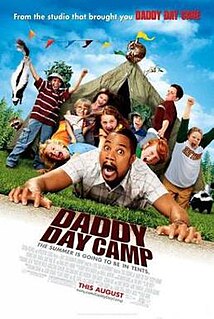
Daddy Day Camp is a 2007 American comedy film starring Cuba Gooding Jr., and directed by Fred Savage in his film directorial debut. It is the sequel to 2003's Daddy Day Care; however, all the lead characters were recast. The film was produced by Revolution Studios and released by TriStar Pictures, unlike its predecessor, which was distributed by Columbia Pictures. The film was released in the United States on August 8, 2007.

Luoping County is located in Qujing City, in eastern Yunnan province, China, bordering Guizhou province to the east and the Guangxi Zhuang Autonmomous Region to the southeast.
Richardson International is a privately held Canadian agricultural and food industry company headquartered in Winnipeg, Manitoba. Richardson is a worldwide handler and merchandiser of all major Canadian-grown grains and oilseeds and a vertically-integrated processor and manufacturer of oats and canola-based products. Richardson has over 2,500 employees across Canada and the U.S.
Richardson International is a subsidiary of James Richardson & Sons, Limited, established in 1857.
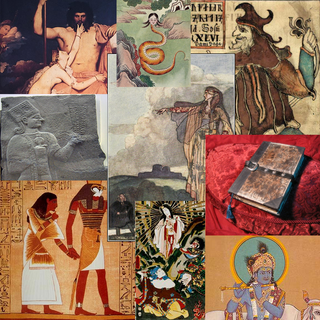
Myth is a folklore genre consisting of narratives that play a fundamental role in society, such as foundational tales. The main characters in myths are usually gods, demigods or supernatural humans. Myths are often endorsed by rulers and priests and are closely linked to religion or spirituality. In fact, many societies group their myths, legends and history together, considering myths to be true accounts of their remote past. In particular, creation myths take place in a primordial age when the world had not achieved its later form. Other myths explain how a society's customs, institutions and taboos were established and sanctified. There is a complex relationship between recital of myths and enactment of rituals.
This article discusses topics relating to genetic engineering within Oceania. Currently New Zealand and Australia require labeling so consumers can exercise choice between foods that have genetically modified, conventional, or organic origins.
